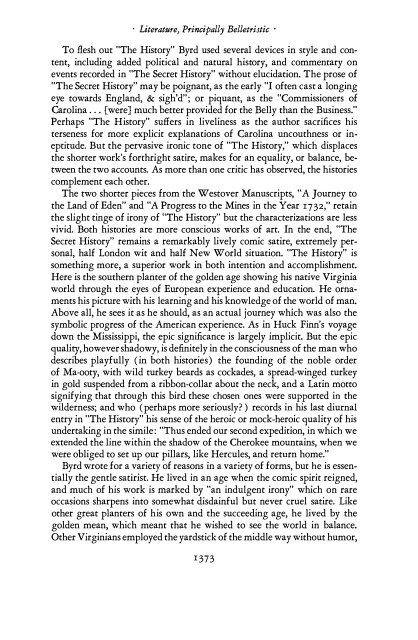Literature, Principally Belletristic - University of Tennessee, Knoxville
Literature, Principally Belletristic - University of Tennessee, Knoxville
Literature, Principally Belletristic - University of Tennessee, Knoxville
You also want an ePaper? Increase the reach of your titles
YUMPU automatically turns print PDFs into web optimized ePapers that Google loves.
· <strong>Literature</strong>, <strong>Principally</strong> BelletriJtic .<br />
To flesh out "The History" Byrd used several devices in style and content,<br />
including added political and natural history, and commentary on<br />
events recorded in "The Secret History" without elucidation. The prose <strong>of</strong><br />
"The Secret History" may be poignant, as the early "I <strong>of</strong>ten cast a longing<br />
eye towards England, & sigh'd"; or piquant, as the "Commissioners <strong>of</strong><br />
Carolina . .. (were) much better provided for the Belly than the Business."<br />
Perhaps "The History" suffers in liveliness as the author sacrifices his<br />
terseness for more explicit explanations <strong>of</strong> Carolina uncouthness or ineptitude.<br />
But the pervasive ironic tone <strong>of</strong> "The History," which displaces<br />
the shorter work's forthright satire, makes for an equality, or balance, between<br />
the two accounts. As more than one critic has observed, the histories<br />
complement each other.<br />
The two shorter pieces from the Westover Manuscripts, "A Journey to<br />
the Land <strong>of</strong> Eden" and "A Progress to the Mines in the Year 1732, " retain<br />
the slight tinge <strong>of</strong> irony <strong>of</strong> "The History" but the characterizations are less<br />
vivid. Both histories are more conscious works <strong>of</strong> art. In the end, "The<br />
Secret History" remains a remarkably lively comic satire, extremely personal,<br />
half London wit and half New W orId situation. "The History" is<br />
something more, a superior work in both intention and accomplishment.<br />
Here is the southern planter <strong>of</strong> the golden age showing his native Virginia<br />
world through the eyes <strong>of</strong> European experience and education. He ornaments<br />
his picture with his learning and his knowledge <strong>of</strong> the world <strong>of</strong> man.<br />
Above all, he sees it as he should, as an actual journey which was also the<br />
symbolic progress <strong>of</strong> the American experience. As in Huck Finn's voyage<br />
down the Mississippi, the epic significance is largely implicit. But the epic<br />
quality, however shadowy, is definitely in the consciousness <strong>of</strong> the man who<br />
describes playfully (in both histories) the founding <strong>of</strong> the noble order<br />
<strong>of</strong> Ma-ooty, with wild turkey beards as cockades, a spread-winged turkey<br />
in gold suspended from a ribbon-collar about the neck, and a Latin motto<br />
signifying that through this bird these chosen ones were supported in the<br />
wilderness; and who (perhaps more seriously? ) records in his last diurnal<br />
entry in "The History" his sense <strong>of</strong> the heroic or mock-heroic quality <strong>of</strong> his<br />
undertaking in the simile: "Thus ended our second expedition, in which we<br />
extended the line within the shadow <strong>of</strong> the Cherokee mountains, when we<br />
were obliged to set up our pillars, like Hercules, and return home."<br />
Byrd wrote for a variety <strong>of</strong> reasons in a variety <strong>of</strong> forms, but he is essentially<br />
the gentle satirist. He lived in an age when the comic spirit reigned,<br />
and much <strong>of</strong> his work is marked by "an indulgent irony" which on rare<br />
occasions sharpens into somewhat disdainful but never cruel satire. Like<br />
other great planters <strong>of</strong> his own and the succeeding age, he lived by the<br />
golden mean, which meant that he wished to see the world in balance.<br />
Other Virginians employed the yardstick <strong>of</strong> the middle way without humor,<br />
1373















